- Home
- Thomas E. Sniegoski
Where Angels Fear to Tread rc-3 Page 3
Where Angels Fear to Tread rc-3 Read online
Page 3
“See if I invite you out on my dime again,” the homicide cop said, going back to his mustard-drenched sandwich.
“It’s a gift certificate,” Remy reminded him.
“Yeah, that I could have used with any number of hot babes trying to become the next Mrs. Mulvehill.”
Remy laughed, leaning back in his chair. “Any number of babes?” he repeated. He pulled a few more fries from his plate. “That’s good.”
“What, you don’t think I’m desirable?” Mulvehill asked with a smile, a giant gob of brown mustard oozing down his chin.
“If we weren’t in a public place, I’d take you now, you gorgeous hunk of man,” Remy said.
They both laughed, then turned their attentions toward finishing their meals.
“Did you really want to burn her?” Mulvehill asked suddenly, breaking their silence. “Seriously?”
Remy looked up into his friend’s worried gaze. He couldn’t lie to him. “Yeah, I did,” he answered quietly. He took the napkin from his lap and wiped his mouth.
“I have to say that isn’t such a good thing.”
Remy agreed. “No, and it worries me. Since Madeline. . I feel myself drifting. . Not all the time, but sometimes, when certain things push a button.”
Mulvehill noisily chewed the last of his pastrami sandwich and wiped the grease and mustard from his face. “The next well-done corpse I find in the city, I’m looking for you, pal,” he said.
Remy gripped his water glass, staring at the ice and lemon slice. “It scares me.”
His friend remained quiet. No snarky comeback; it wasn’t the time.
“I’m afraid of the day when I can’t. . when I don’t want to keep it inside anymore.”
“Is that a possibility?” Mulvehill asked.
“Could be.” Remy shrugged. “Probably not right now, but there could come a time when I won’t have the things around me that keep me anchored to this world.”
“Like Maddie,” Mulvehill said quietly.
Remy silently nodded. “She was the most amazing thing in my life here, but now there’s just this giant void where she used to be.” He could feel a darkened mood descending on him, as it had a tendency to do when he thought too hard about things connected to his fragile humanity.
“I know what your problem is,” Mulvehill said, tossing his napkin onto the tabletop. “I should’ve given you the gift certificate.”
Remy looked across the table at his friend. “Should’ve given me the gift certificate? What the hell are you talking about?”
“You could’ve used it for a date,” Mulvehill said. “You could’ve taken somebody out for a nice dinner and maybe found a new anchor—not that anybody could ever replace Maddie. I’m just saying it might help.”
Remy had to laugh. “You think I should date?” he asked incredulously.
“Yeah, why not?” Mulvehill asked. “What was the name of that woman you told me about?” He snapped his fingers. “The waitress. . you know who I mean.”
“Linda,” Remy said, focusing on the water in his glass again.
“Yeah, Linda. Why not go out with her?”
It was all so very complicated. Remy had met Linda Somerset through Francis. During the Great War in Heaven, Francis had chosen the wrong side, but then saw the error of his ways and was desperate to make amends. The Almighty had given him the duty of watching over one of the passages to the Hell prison of Tartarus, which just so happened to be in the basement of the apartment building that the Guardian angel owned on Newbury Street.
The last time Remy saw Francis, he had been badly wounded in the effort to prevent the Morningstar’s catastrophic return to Hell. Remy still held out hope that somehow Francis had managed to survive.
Although as time passed, it was becoming less and less likely.
Francis had been obsessed with Linda Somerset, even though she knew nothing of his interest. Remy had spoken to the attractive waitress at Newbury Street’s Piazza restaurant a few times since Francis’ disappearance, and he could understand his friend’s fixation.
There was definitely something about Linda Somerset.
“I’d rather not talk about it,” Remy said, hoping, but doubting, that would be the end of the discussion.
Their waiter approached the table. “Are you gentlemen finished?” he asked, reaching for their plates.
“Could you wrap that last piece of burger in some foil for me?” Remy asked the well-groomed Hispanic man who had introduced himself as Harry.
Harry smiled. “You must have a dog?” he asked, lifting the plate from the table.
“No, he’s gonna have that as a snack later,” Mulvehill offered. “He’s really cheap.”
“Will you shut up,” Remy snarled. “Yes, I do, and if I don’t bring him something, I’m going to be in trouble.”
“No problem,” Harry said. “Any coffee or dessert?”
They both declined, Mulvehill sticking out his belly and patting it as a sign that he was sated.
The waiter said he’d be back with Remy’s food, and the check, excusing himself as he left with their dirty plates.
“So, why not?” Mulvehill started up again
“I said I don’t want to talk about it,” Remy said, trying not to become upset with his friend. He did not want to even think about burning his best friend alive. “It’s far too early for me to even be thinking about things like this; Madeline hasn’t even been gone six months.”
“Stop right there,” Mulvehill said. “I don’t mean to be cold or heartless, but you just said the magic words.”
Remy tilted his head inquisitively to one side, as he’d so often seen Marlowe, his four-year-old Labrador retriever, do.
“Madeline’s gone, Remy,” the detective said. “I know how you felt about her—I loved her too—but if her being gone and your being lonely mean you’re going to start losing your shit and frying people every time you get annoyed, maybe you should think about the benefits of some female companionship.”
Mulvehill’s words were like a kick to the teeth, and Remy really didn’t know how to react.
“You’re not pissed that I said that, right?” Mulvehill asked cautiously as Harry returned to the table with their check and Remy’s leftovers wrapped in foil.
“No,” Remy lied.
“You’re not gonna cook my ass?” he asked, pulling the wrinkled gift certificate from the inside pocket of his sports jacket and placing it in the leather folder with the check and an equally wrinkled twenty-dollar bill.
At first Remy didn’t answer.
“You heard what I said about the dangerous levels of alcohol in your body.”
“Screw you. Are you mad at me or not?”
“I’m not mad. I just don’t want to talk about this anymore,” Remy said, slowly getting up from his seat.
“You said Maddie’s been gone for less than six months, and I bet it’s been the longest almost six months of your life, hasn’t it?” the normally unemotional man said, gripping Remy’s elbow. “I hate to see you like this and then to hear you say things about losing control. It just gets me thinking that. .”
“I’m all right, Steven,” Remy said, forcing a smile. “Really, I’m all right. I think this case just brought out my bad side, but it’s done now, and I can get back to my naturally cheerful self.”
He felt his friend studying him, searching for a sign, a crack in the armor. Remy started for the door so Mulvehill couldn’t look closer.
“Hey, Chandler,” his friend called.
Remy turned slowly.
The homicide detective was holding the piece of foil-wrapped hamburger.
“You taking this or do you want to be on your dog’s shit list?”
Remy returned to take the package from Mulvehill.
If there was one shit list he couldn’t bear to be on, it was Marlowe’s.
Marlowe paced excitedly in the backseat of Remy’s Corolla.
“Rabbits.” Remy heard the dog muttering beneath
his breath in the guttural language of his breed. “Rabbits, rabbits, rabbits.”
“And maybe squirrels,” Remy contributed, looking at the dog’s reaction in his rearview mirror.
“Maybe squirrels,” Marlowe repeated. “Rabbits; maybe squirrels.”
Remy had returned to his Pinckney Street home, strangely agitated after his dinner with Steven Mulvehill. His friend had definitely touched on a particularly sensitive nerve.
Putting his signal on, Remy took a right into the parking lot of Mount Auburn Cemetery. He had the pick of the lot and eased into a space in a nice patch of shade thrown by an oak tree.
His wife had been gone for nearly six months and he still felt the magnitude of her passing each and every day. The idea that he could push aside her memory, and the love he still felt for her, was unthinkable.
So why was it that deep down, he knew his friend was probably right?
Marlowe was panting like a runaway freight train as he turned off the car’s engine and opened the door to a blast of August heat.
“All right, all right,” Remy said, opening the passenger-side rear door.
Marlowe leapt out, immediately placing his nose to the ground and beginning to track his prey.
“Anything?” Remy asked.
“Rabbits; maybe squirrels,” Marlowe reported quite seriously.
“Thought so,” Remy answered.
There was no one in sight, so he let Marlowe roam. He followed his dog through the metal gateway onto the winding path that led through one of the prettiest cemeteries in the Greater Boston area. Marlowe continued the hunt, nose moving along the ground, and off the path to the grassy areas around the trees and grave markers.
“Hey!” Remy called.
The Labrador stopped and lifted his head.
“No peeing on the headstones,” Remy reminded him.
“No pee,” Marlowe grumbled.
It was certainly hot, but there was a hint of a cooling breeze from the north, a harbinger of less-stifling weather, and perhaps even some much-needed rain, the angel thought.
The vast lawns surrounding the grave sites were dappled with dried, brown patches of grass, and even the trees had that parched, withered look with branches hanging low.
But things couldn’t have been more different at Madeline’s plot.
The green around her grave site was lush, dark, and healthy, with wildflowers more vibrant than all the colors of the rainbow surrounding her concrete marker as if in celebration. This was how it was year-round, a special gift to her memory—a thank-you from the Angel of Death, Israfil, to Remy, for his help in preventing the angel from triggering the Apocalypse.
Remy approached the grave as he normally did, feeling the same pangs of sadness then that he’d had during his very first visit.
“Hey, beautiful,” he said, reading her name on the stone, while admiring some of the more unusual blooms that flourished there. He was pretty sure that most of the flowers weren’t even native to this hemisphere, but here they were, growing just for her.
“How’re things?” he asked, kneeling upon the grave. There were some weeds growing up amongst the flowers, and he reached down, plucking them from the always-fertile ground.
Remy knew his wife wasn’t actually there anymore.
He knew full well that when she had passed, her remaining life energies had immediately left her body and returned to the source of power in the universe that made all things. The stuff of creation; Madeline was in the sun and the stars, the trees and the grass; a part of everything that flew, crawled, swam, slithered, ran, and walked upon the surface of the earth.
Yes, Madeline as he remembered her wasn’t there anymore, but he liked to come to this place of beauty to honor her memory. It was a monument to the amazing person she had been and to the special love they had shared.
Remy found himself pondering Mulvehill’s words. They’d struck a chord deep within him.
It wasn’t as though he’d never had the thought himself. Remy knew he was lonely, and in moments of weakness, had briefly considered the what-ifs of seeking companionship. But his thoughts would always return to Madeline and how it all felt like some sort of horrible betrayal to her memory.
That was why he had come today, just the thought that Steven Mulvehill might be right sending him to his wife’s grave site for penance.
“There could never be another you,” he used to tell her, and he remembered the smile that would appear on her face. It still had the same effect on him, even if it was only from memory.
His stomach sort of dropped, as though he were on an elevator suddenly starting down to the next floor, and then he smiled, recalling how lucky he had been to have had her in his life.
But now she was gone, leaving behind a sucking void of loneliness that seemed impossible to fill.
And did he truly want to?
That was the question, and the reason he was so disturbed by Mulvehill’s observation that it might be time to let go of the past and look to the future.
“If I can’t have you, do I want anybody else?” he asked the grave, not expecting an answer.
He rose to his feet, brushing some stray blades of grass and dirt from the front of his jeans, and looked to see where Marlowe had gotten to. He could see the dog off in the distance, circling the base of an oak tree, and called to him. The dog glanced threateningly up the tree, then gave a single bark, a warning to a squirrel that next time it wouldn’t be so lucky, before bounding across the cemetery toward Remy.
“Did you give that squirrel the business?” Remy asked the Labrador as he lovingly patted his head.
The dog panted furiously, lapping up the affection.
“Gave business,” Marlowe agreed, his thick pink tongue lolling with the heat.
“I think it’s time to go,” Remy told him, and the dog agreed, turning toward the trail back to the parking lot and the air-conditioned car.
“Aren’t you going to say good-bye to Madeline?” Remy asked the back of the animal.
“Not there,” Marlowe said, not even turning around. “Madeline gone.”
Madeline gone.
* * *
They returned to Beacon Hill only a little late for Marlowe’s supper, but the dog nevertheless wasted no time in letting Remy know.
“I don’t remember your ever being this demanding,” Remy said. He picked up Marlowe’s water bowl and rinsed it before refilling it with fresh water. “Is this some new teenage phase you’re going through?”
“Hungry,” the dog said, his tail wagging.
“You’re always hungry,” Remy responded, pulling a plastic container filled with food out of a lower cabinet. Using a metal measuring cup, he dumped a full scoop of the nugget-sized food into another metal dish.
“This stuff looks delicious,” Remy said jokingly, giving the bowl a shake. The contents rattled enticingly.
Marlowe’s eyes were locked on the bowl as Remy crossed the kitchen to set it down beside the water.
“Go to it,” he said, stepping back as the hungry Labrador charged the bowl and immediately began to eat.
“Don’t forget to chew,” Remy warned. They’d had some problems with this in the past, usually on the living room carpet or in Remy’s bed.
“Is it all right if I have a moment to myself now?” he asked the animal.
The dog ignored him, chowing down on the tasty morsels that filled his bowl.
“I guess that’s a yes,” Remy said. He reached down and thumped the dog’s side with his hand, before turning toward the kitchen doorway.
And then he noticed the flashing red light of his answering machine on the counter.
“Huh,” he said, having a hard time remembering the last time he’d had a message on his landline, never mind receiving a call. Most of his calls these days came over his cell, or the office phone.
He stopped and pushed the PLAY button.
You have one new message, the machine told him in a clipped, mechanical voice, over the s
ound of Marlowe’s slurping at his water bowl.
At first there was the hiss of silence, and for a second Remy thought it might be a hang-up, but then a woman began to speak.
“Um, hi. .” There was another pause, the woman grumbling something beneath her breath that Remy couldn’t make out.
He leaned closer to the machine.
“Yeah, ummm, this message is for Remy Chandler. . I’m calling because. .”
Again she paused, and he listened as she whispered to herself, “How do I say this without your thinking I’m crazy?”
Marlowe had joined him, wiping his face, still wet from his drink, on the side of Remy’s leg.
Thank you very much, Marlowe, he wanted to tell the dog, but he was still listening to the message.
“I’m calling to ask. . Why am I calling?” She sounded frustrated, and perhaps a little confused. “I was calling to ask. . I was calling to ask if you had a big black dog,” she finally said.
Remy quickly glanced at Marlowe, who was looking up at him with that patented Labrador smile and tail wag.
“Oh my God, I can’t believe I did this,” she finally said and, without another word, ended the call.
End of message, his machine then told him with a high-pitched beep.
“Okay,” he said to himself, and then to the dog standing beside him, “What the hell was that all about?”
But Marlowe didn’t have any answers either.
CHAPTER TWO
Clifton Poole took a deep breath, then slowly exhaled, awaiting the effects of the drug combination he’d just taken.
It was a special cocktail of barbiturates and antidepressants made just for him after years of trial and error. It was the only thing that would silence the voices.
Everything in the world had a voice—psychic impressions left by contact with living beings—and Poole could hear them all, whether he wanted to or not, which was why he so enjoyed his special medication, and the numbing bliss it provided him, no matter how short.
He lay naked in the windowless room of his country estate in Lincolnshire, England, surrounded by nothing. Built to his own specifications, the room was only cold plaster walls and ceiling and a wooden floor. No more than three people were involved with its design and construction, and the materials had come from local merchants.

 Dark Exodus
Dark Exodus A Hundred Words for Hate rc-4
A Hundred Words for Hate rc-4 The Fallen
The Fallen Where Angels Fear to Tread rc-3
Where Angels Fear to Tread rc-3 Armageddon
Armageddon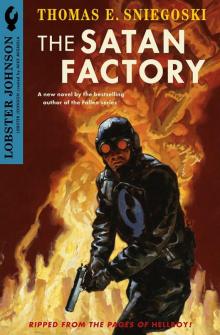 The Satan Factory
The Satan Factory In the House of the Wicked: A Remy Chandler Novel
In the House of the Wicked: A Remy Chandler Novel A Hundred Words for Hate
A Hundred Words for Hate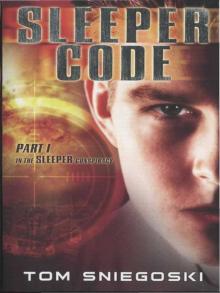 Sleeper Code
Sleeper Code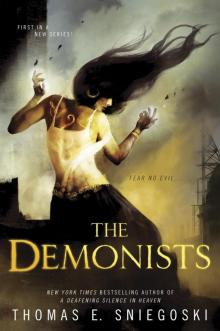 The Demonists
The Demonists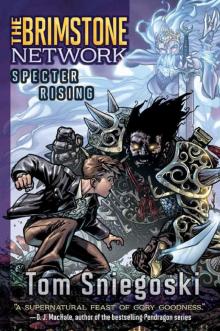 Specter Rising (Brimstone Network Trilogy)
Specter Rising (Brimstone Network Trilogy) Dancing on the Head of a Pin
Dancing on the Head of a Pin The Shroud of A'Ranka (Brimstone Network Trilogy)
The Shroud of A'Ranka (Brimstone Network Trilogy) The Flock of Fury
The Flock of Fury Where Angels Fear to Tread
Where Angels Fear to Tread Leviathan
Leviathan Walking In the Midst of Fire: A Remy Chandler Novel
Walking In the Midst of Fire: A Remy Chandler Novel Billy Hooten
Billy Hooten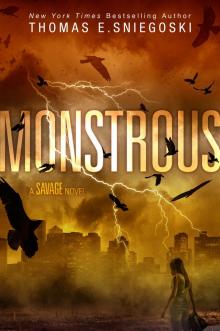 Monstrous
Monstrous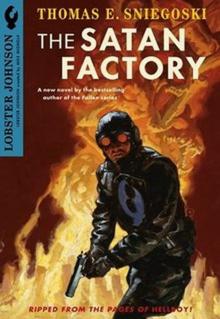 Lobster Johnson: The Satan Factory
Lobster Johnson: The Satan Factory Legacy
Legacy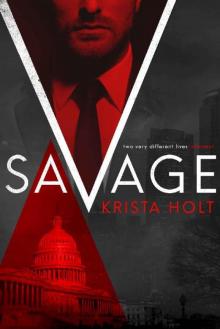 Savage
Savage Walking In the Midst of Fire rc-6
Walking In the Midst of Fire rc-6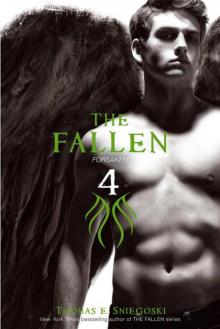 The Fallen 4
The Fallen 4 A Deafening Silence In Heaven
A Deafening Silence In Heaven A Kiss Before the Apocalypse
A Kiss Before the Apocalypse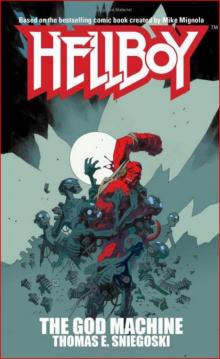 The God Machine
The God Machine Sleeper Agenda
Sleeper Agenda The Girl with the Destructo Touch
The Girl with the Destructo Touch Dancing On the Head of a Pin rc-2
Dancing On the Head of a Pin rc-2 In the House of the Wicked rc-5
In the House of the Wicked rc-5 Reckoning f-4
Reckoning f-4 The Fallen 3
The Fallen 3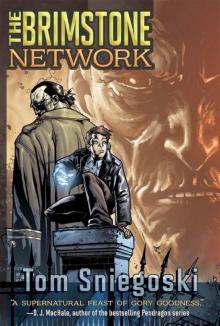 The Brimstone Network (Brimstone Network Trilogy)
The Brimstone Network (Brimstone Network Trilogy) The Fallen 2
The Fallen 2 The Fallen f-1
The Fallen f-1